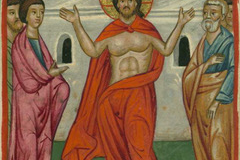Overview of Anglican Primates' Meeting
The future of the Anglican Communion has major implications for relations with other churches. The Anglican News Service has just sent out this guide for ecumenical partners. The Primates of the Anglican Communion met together at Lambeth Palace on 15 and 16 October in response to recent developments within the Anglican Church of Canada and the Episcopal Church of the United States of America. These developments included the election of a priest in a committed same sex relationship as a bishop, and the authorisation by one diocese in Canada of a public Rite of Blessing for Same Sex Unions. In their Statement at the end of the meeting, the Primates said four main things - (a) they committed themselves to working together in the Communion as far as possible, (b) they reaffirmed the teaching of the Anglican Communion on sexual ethics, (c) they acknowledged that recent developments will damage the Communion, and (d) they established a commission to take matters further. 1. The Primates expressed their unanimous commitment to the ongoing life of the Communion. The meeting reaffirmed, and indeed celebrated, the Anglican tradition of faith and worship, and all the primates are committed to co-operating together as far as possible in the Communion's shared work and witness, in spite of disagreements on the issue of homosexuality. 2. The Primates also reaffirmed the traditional teaching of the Communion in relation to the issue of homosexuality, as expressed at the Lambeth Conference 1998 in Resolution 1.10. They reaffirmed the whole of this resolution, including commending the main report of the Lambeth Conference on this issue to the members of the Communion, and the commitment to listen to the experience of homosexual persons in an ongoing process of study. 3. This reaffirmation means that the wider Communion cannot support the recent developments for the blessings of same sex unions or the election of Canon Gene Robinson as Bishop of New Hampshire. Indeed, the ministry of Gene Robinson as a bishop will not be recognised or received in the vast majority of the Anglican world. What are the consequences of all of this? 4. First, it means that a state of impaired or broken Communion is beginning to exist between many parts of the Anglican world and the Diocese of New Westminster in Canada. The Anglican Church of Canada is still in the process of resolving the questions that the authorisation of a public Rite of Blessing for Same Sex Unions in that diocese raise, and it is unlikely that any further developments can occur until the Canadian General Synod has met in 2004. 5. Secondly, for many parts of the Anglican Communion a state of impaired or broken communion will exist with the Diocese of New Hampshire, given the assumption that the Consecration will go ahead, and possibly with the whole of the Episcopal Church (USA). What are the wider implications? 6. Questions remain about the nature, extent and duration of this impaired or broken communion. Will a breach inCommunion between two parts of the Anglican Communion mean a Communion-wide split with each province having to choose between one side or the other? How will these divisions affect the relationship of each province with the See of Canterbury as the centre of unity of the Communion? 7. In order to answer these questions, the Primates have requested the Archbishop of Canterbury to establish a Commission which will report in twelve months time to the next meeting of the Primates. Until then, provinces have been urged by the Primates to avoid precipitate action. 8. The Department of Ecumenical Affairs and Studies will be pleased to respond to any enquiries ecumenical partners on these issues, and can be contacted at the Anglican Communion Office. Gregory K Cameron, Director of Ecumenical Affairs and Studies, London, 17 October 2003


















